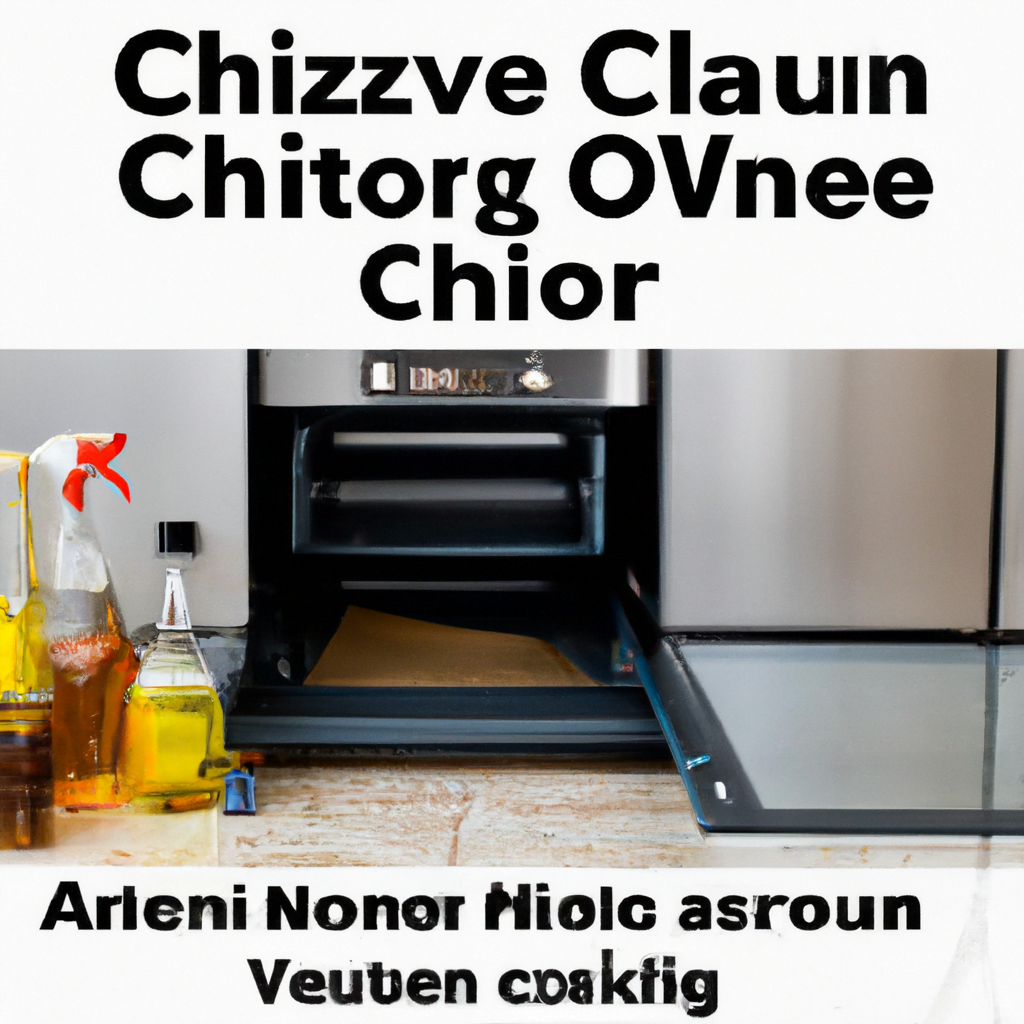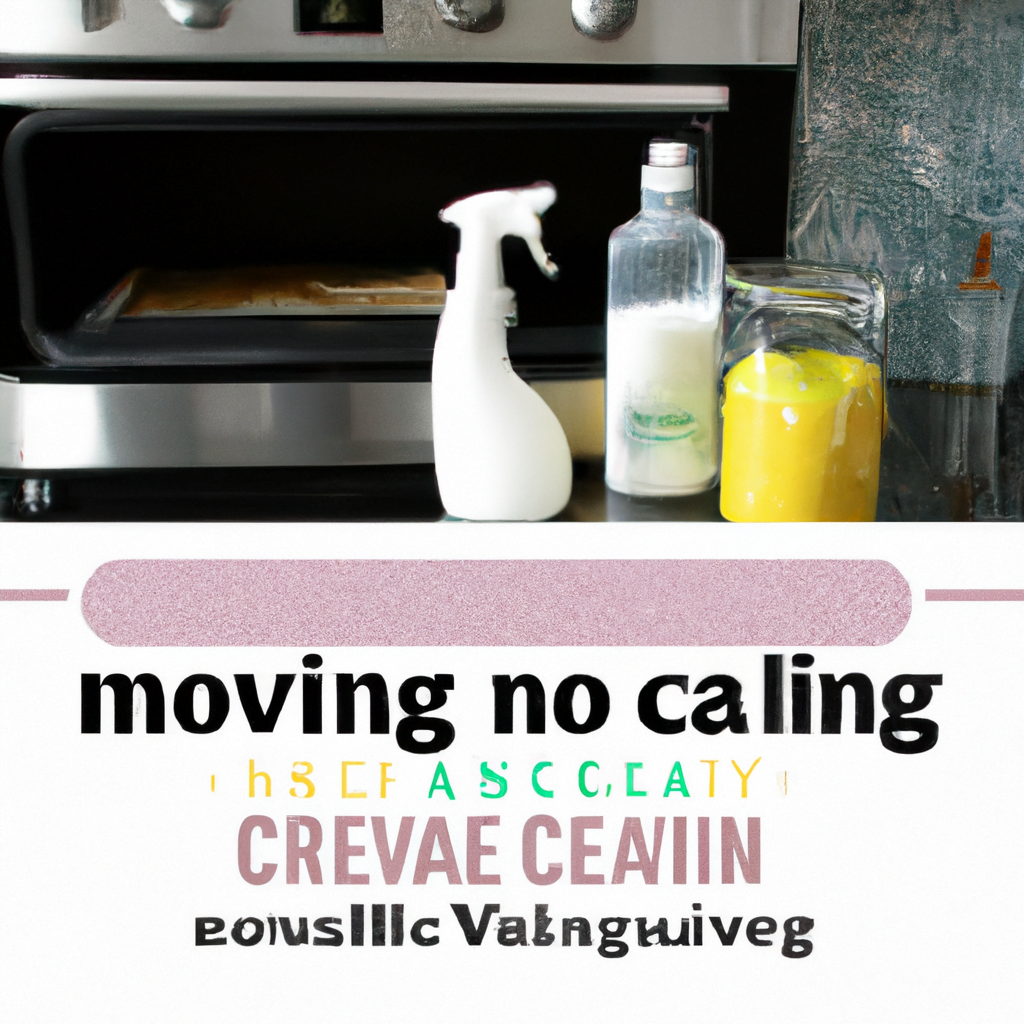Imagine a world where grime and grease no longer conquer the splendor of your beloved oven. Picture yourself taming the stubborn stains with an easy-to-make, cost-effective, and eco-friendly solution made within the serene comfort of your own kitchen. That is precisely the pearl of wisdom your are about to discover in this article. Brace your senses as you journey through the empowering knowledge of concocting your very own homemade oven cleaner recipe. Transcend beyond the ordinary, and unlock a realm of radiant ovens only few can dream of!

Reasons to Make a Homemade Oven Cleaner
Making a homemade oven cleaner might seem like an unnecessary exercise when there are so many commercial cleaners available. However, there are many valid reasons why you should consider making your oven cleaner at home.
Health consideration
Commercial oven cleaners are often loaded with harmful chemicals that create harmful fumes and could pose a health risk to you and your family. These potentially dangerous chemicals can get into your food, irritate your skin and lungs, and can even damage your oven’s interior.
Cost-effective solution
The cost of store-bought oven cleaners can add up over time. More so, considering you are essentially paying for a container filled mostly with water combined with some chemicals. In contrast, homemade oven cleaners can be made quite inexpensively using ingredients you probably already have in your home, such as baking soda and vinegar.
Environment-friendly approach
Store-bought oven cleaners come in plastic packaging, contributing to environmental pollution. By making your oven cleaner at home, you can help reduce the amount of plastic waste you produce. Moreover, most homemade oven cleaners are biodegradable and non-toxic, making them a more environmentally friendly alternative to commercial cleaners.
Benefits of Homemade Oven Cleaner
Homemade oven cleaners not only help you maintain a clean oven but also come with several other benefits.
Reduction of chemical exposure
By making your oven cleaner at home, you can control exactly what goes into the mix. This ensures you are not exposing your household and yourself to potentially harmful substances typically found in commercial oven cleaners.
Less harmful to the oven
The harsh chemicals contained in store-bought cleaners can corrode and discolor the interior of your oven over time. Homemade cleaners are gentler and therefore present less of a threat to your oven’s longevity.
Safe for children and pets
Homemade oven cleaners are typically made from non-toxic substances making them safe to use around children and pets.
Before you get started: Safety Tips
Before you begin making your oven cleaner, it’s essential to adhere to the following safety measures.
Proper handling of ingredients
Though much safer than commercial cleaners, homemade cleaners still require careful handling. Some ingredients, like vinegar and lemon, can be irritating if they get on your skin or in your eyes.
Avoiding skin and eye contact
When making your homemade oven cleaner, be sure to wear gloves to protect your hands and safety goggles to shield your eyes.
Method of storage and shelf life
Store your homemade oven cleaner in a well-labeled bottle away from children and pets. As these cleaners contain no preservatives, use them within a few weeks to a month of making them for best results.
Necessary Ingredients for a Homemade Oven Cleaner
There are plenty of recipes to make homemade oven cleaners, but the basic ingredients mostly remain the same.
Using baking soda and vinegar
This combination is amongst the most popular for homemade oven cleaners. The baking soda helps cut through grease and grime, while the vinegar reacts with it to facilitate easy cleaning.
Using lemon and water
Lemons are naturally high in citric acid, providing great cleaning and disinfecting properties. Combined with water, it offers a pleasantly scented and effective cleaning solution.
Using salt, vinegar and borax
Salt and borax are excellent adbrasives that work great in removing tough grime while vinegar helps dissolve grease and neutralize odors.

Step by Step Process: Make Your Own Oven Cleaner
Creating your own oven cleaner is a simple process.
Mixing the ingredients
Combine your chosen ingredients in a large bowl. Stir until thoroughly mixed.
Applying the solution
Use a scrub brush or sponge to apply the cleaner to the surface of your oven. Remember to wear gloves and goggles for protection.
Waiting period
After applying the cleaning solution, let it sit for at least 20 minutes to loosen the dirt and grime.
Cleaning off the solution
Wipe down the surfaces with a damp cloth. For stubborn spots, lightly scrub with a brush.
Alternative Homemade Oven Cleaner Recipes
There are also other efficient methods you can employ in creating an oven cleaner at home.
Utilizing dish soap
Plain dish soap combined with baking soda is an unlikely yet efficient oven cleaning duo. They work together to break down grease easily.
Employing ammonia
If you need to deal with tougher grime and have proper safety measures in place, a small amount of household ammonia can be added to your homemade cleaners to boost its cleaning power.
Using Homemade Oven Cleaners for Different Types of Ovens
It is essential to be aware of your oven type before applying any cleaning solution.
For gas ovens
Gas ovens can be cleaned using homemade cleaners. However, be sure to avoid getting any cleaner into the gas line to prevent damage and possible dangerous situations.
For electric ovens
With electric ovens, you’ll want to make sure not to get the cleaning solution on the heating elements, as it can potentially harm them.
For convection ovens
Convection ovens have fans, so it’s important to ensure your cleaner does not get into the fan system. If the cleaner enters the fan system, it can lead to mechanical problems.
Effectiveness of Homemade Oven Cleaners
Comparison with store-bought cleaners
While homemade cleaners might not be as potent as commercial ones, they are effective, safe, and gentler on your oven. For particularly stubborn grime, you might need to clean more than once.
Factors affecting the performance
The effectiveness of your homemade cleaner depends on many factors, including the correct ratios of your ingredients, the amount of time you let the solution sit on dirt and grime, and the amount of elbow grease you’re willing to put in.
Potential Issues and Their Solutions
With homemade oven cleaners, there may be some minor hurdles to face.
Reduced cleaning power
If your homemade cleaner isn’t as effective as you’d hoped, try changing your ingredient ratios or adding a little more of the abrasive component.
Unpleasant smell
If the smell isn’t to your liking, adding a few drops of your favorite essential oil can help.
Possible reactions with oven material
Always do a spot check with your homemade cleaner on a hidden area to ensure it won’t discolor or damage your oven.
Maintenance Tips for a Cleaner Oven
To keep your oven cleaner for longer periods, follow these tips.
Regular cleaning habits
Regularly cleaning your oven can prevent the buildup of grime which, over time, can become difficult to clean.
Proper use of homemade cleaners
Ensure that you use your homemade oven cleaner safely and effectively by following all recommended steps, including allowing adequate dwell time for the cleaner to work.
Prevention of major spillage
Prevent major spills by placing a baking sheet or a tray under your dish while cooking. Keeping an eye on your cooking and not overfilling your dishes can also help prevent major spills.
These actions will save you time and lessen the need for harsh cleaning methods, enabling you to enjoy a safer, cleaner cooking experience right in your own kitchen.
